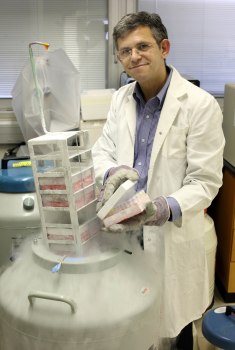| | 09 June, 2010
| | World-Recognized Research on Stem Cells wins First Prize in Kaye Awards for Hebrew University Researcher | |
 | | Prof. Nissim Benvenisty (photo by Sasson Tiram) |
|
World-recognized discoveries in the study and manipulation of human embryonic stem cells have won first prize in a prestigious applied research competition for a Hebrew University of Jerusalem researcher.
For his work in this field, Prof. Nissim Benvenisty of the Silberman Institute of Life Sciences will be presented with a Kaye Innovation Award on June 9 during the Hebrew University of Jerusalem Board of Governors meeting.
Benvenisty and his research team were the first in the world to demonstrate in vitro
differentiation of human embryonic stem (ES) cells, and to achieve the first directed differentiation and the first genetic manipulation of these cells. Their work has led to a patent on the directed differentiation of human embryonic stem cells and is at the center of industrial use of this research, aimed primarily at developing a stem cell based approach for battling type 1 diabetes. :
A pluripotent (developmentally undefined) cell that may differentiate in culture to all cell types is the ”holy grail” of the study of cellular differentiation and of cell-based therapy.
Human embryonic stem (ES) cells may give rise to many cell types of the body, such as nerve, muscle, liver, heart and blood, and thus they hold the promise to change the face of transplantation medicine. These cells may be able to play a vital role in the therapy of a large number of diseases, such as Parkinson’s, diabetes, liver cirrhosis, cardiac failure, and others.
Benvenisty’s laboratory has made, over the years, significant discoveries in the field, showing for the first time, among other things, in vitro differentiation of human ES cells and generation of embryoid bodies – aggregates of cells derived from embryonic stem cells. They also have been able to induce differentiation of the ES cells by placing them next to a developing tissue in a chick.
Benvenisty cautions that the issue of transplantation of human ES cells also brings up the challenge of their possible rejection. His analysis of the immunogenicity of human ES cells has shown that although undifferentiated human ES cells express extremely low levels of immunogenic (rejecting) molecules, this expression is up-regulated when they differentiate,. Thus, human ES cells will probably be a target for cell rejection, and ways to overcome this issue should be further explored, he says.
During the past ten years, the research coming out of this laboratory has been published
in over 50 papers, with many of the articles on human ES cells appearing as a cover story in the various journals in which they were published.
SCT - Stem Cell Technologies Ltd. was founded late in 2004 in order to capitalize on the
experience and ongoing research from the Hebrew University of Jerusalem and from the Technion-Israel Institute of Technology in Haifa in the field of human ES cells. SCT is owned in equal shares by Yissum, the research and development company of the Hebrew University of Jerusalem, and TRDF – the Technion Research and Development Foundation.
The main goal of SCT is to direct human ES cells to differentiate into insulin-secreting
pancreatic beta cells for transplantation into diabetic patients. type 1 diabetes
is an autoimmune disease caused by destruction and loss of function of beta cells in the
pancreas. As a result, insulin is not produced, and blood glucose levels are not regulated.
The disease causes a large number of symptoms: blindness, kidney disease and nerve
damage, which can lead to amputations and death.
The mainstay treatment for type 1 diabetes is insulin injections. Although the exogenous insulin therapy has dramatically reduced mortality from diabetes, patients often succumb to the long-term complications. Transplantation of functional pancreatic cells represents one of the most promising approaches towards curing diabetes. However, currently this approach is limited by shortage of tissues. Human ES cells may offer an unlimited source of beta cells for transplantation, once an effective differentiation protocol is developed. SCT has the knowledge, expertise, technologies and IP to develop this differentiation protocol.
The potential revenues pertaining to this invention are tremendous. According to the
World Health Organization, over 150 million people worldwide suffer from diabetes.
About 5%–10% of diabetes cases in North America are type 1, and in the United States
alone the treatment of diabetes costs over $130 billion annually.
The Kaye Innovation Awards have been given annually since 1994. Isaac Kaye of England, a prominent industrialist in the pharmaceutical industry, established the awards to encourage faculty, staff and students of the Hebrew University to develop innovative methods and inventions with good commercial potential which will benefit the university and society.
|
Downloadable File: benvenistyEn.doc |
|


